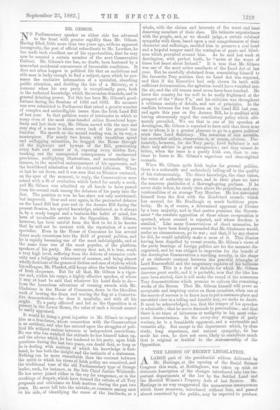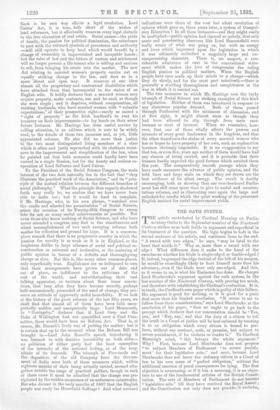THE LESSON OF RECENT LEGISLATION.
ALARGE part of the presidential address delivered by Mr. Hastings, at the opening of the Social Science Congress this week, at Nottingham, was taken up with an elaborate description of the changes introduced into two im- portant departments of the law by the Settled Land and the Married Women's Property Acts of last Session. Mr. Hastings in no way exaggerated the momentous consequences which these measures, introduced without fuss, and passed almost unnoticed by the public, may be expected to produce. Each in its own way effects a legal revolution. Lord Cairns' Act, it is true, falls short of the .wishes of land reformers, but it effectually removes every legal obstacle to the free alienation of real estate. Social causes--the pride of family, the passion for political domination, the reluctance to part with the outward symbols of precedence and authority —will still operate to keep land which would benefit by a change of ownership in impoverished and incapable hands ; but the rules of law and the fetters of custom and settlement will no longer prevent a life-tenant who is willing and anxious to sell, from bringing his estate into the market. The new Act relating to married women's property carries out an equally striking change in the law, and does so in a
more direct and open way. It removes at one blow almost all the proprietary and contractual disabilities which have attached from time immemorial to the status of an English wife. It boldly declares that a married woman may acquire property, make contracts, sue and be sued, as though she were single ; and it deprives, without compensation, all existing husbands, who have married women with "valuable expectations," of their prospective right—surely as sacred a "right of property" as the Irish landlord's to rent his tenantry on their improvements—to Thy hands on their wives' future fortunes. Mr. Hastings has done useful service by calling attention, in an address which is sure to be widely read, to the details of these two immense and, as yet, little appreciated reforms. He also did no more than justice to the two most distinguished living members of a class which is often and justly reproached with its obstinate resist- ance to the improvement and simplification of the law, when he pointed out that both measures could hardly have been carried in a single Session, but for the hearty and zealous co- operation of Lord Selborne and Lord Cairns. To the President of the Social Science Congress, the main interest of the two Acts naturally lies in the fact that "they illustrate the practical work of the Association," and its "prin- ciple of the mutnal relation between the different branches of social philosophy." What the principle thus vaguely shadowed forth may really be, we confess that we have never been able to make out ; but it would be hard to complain, if Mr. Hastings, who, in his own phrase, "watched over the cradle and wheeled the perambulator" of Social Science, seizes the occasion of its Twenty-fifth Congress to sweep into its net as many useful achievements as possible. But even those who know nothing of Social Science, and who have never attended a congress, may find in the simultaneous and silent accomplishment of two such sweeping reforms both matter for reflection and ground for hope. It is a common- place remark that there is no progressive country in which the passion for novelty is as weak as it is in England, or the suspicious dislike to large schemes of social and political re- construction as universal and instinctive, or the maturing of public opinion in favour of -a definite and thoroughgoing change as slow. But this is, like many other common-places, only superficially true. Englishmen are so indisposed to own that their arrangements have grown out of date and out of place, so indifferent to the criticisms of the rest of the world, and notwithstanding their vast talking apparatus, so taciturn about their inner convic- tions, that long after they have become secretly, perhaps half-unconsciously, persuaded of the need of change, they pre- serve an attitude of apparently stolid immobility. If we look at the history of the great reforms of the last fifty years, we shall find that almost all of them have been both unex- pectedly sudden and unexpected]y large. Lord Monmouth, in " Coningsby," declares that if Lord Grey and the Duke of Wellington had not quarrelled over a Coal Com- mittee, there would have been no Reform Act. That is, of course, Mr. Disraeli's lively way of putting the matter ; but it is certain that up to the moment when the Reform Bill was brought in—Lord John Russell's speech introducing it was listened to with derisive incredulity on both sides— no politician of either party had the least conception of the intensity of the national feeling, or of the mag- nitude of its demands. The triumph of Free-trade and the deposition of the old Company from the Govern- ment of India were both of them measures which, within eighteen months of their being actually carried, seemed alto- gether outside the range of practical politics, though in each of these cases it must be admitted that the change was pre- cipitated by the sudden occurrence of an unforeseen catastrophe. But who dreamt in the early months of 1867 that the English people was ready for Household Suffrage ? And what outward indications were there of the vast but silent revolution of opinion which gave us, three years later, a system of Compul- sory Education ? In all these instances—and they might easily be multiplied—public opinion had ripened so quietly, that only acute and penetrating observers like Lord Beaconsfield were really aware of what was going on, but with an energy and force which impressed upon the legislation in which it was ultimately embodied a singularly large and un- compromising character. There is, we suspect, a con- siderable admixture of cant in the conventional state- ment which makes the love of compromise the ruling English passion in political matters. When the English people have once made up their minds to a change—which they do slowly, and for the most part noiselessly—there is generally a startling thoroughness and completeness in the way in which it is carried out.
The two measures in which Mr. Hastings Bees the tardy triumph of Social Science are striking examples of this kind of legislation. Neither of them was introduced in response to any clamorous popular demand. Both of them passed through Parliament with the minimum of discussion, and at first sight, it might almost seem as though they had been allowed to slip through from mere care-
lessness or want of interest. When we remember, how- ever, that one of them vitally affects the powers and interests of every great landowner in the kingdom, and that the other transforms the status of every married woman who has or hopes to have property of her own, such an explanation becomes obviously impossible. It is no exaggeration to say that ten, or even five, years ago neither of them would have had any chance of being carried, and it is probable that their framers hardly expected the good fortune which awaited them this year. The comparatively smooth passage which they have made measures the advance of public opinion, and the bold lines and large scale on which they are drawn are the best evidence of its silent energy. The result is doubly encouraging, both as showing that our over-burdened Parlia- ment has still some spare time to give to useful and unosten- tatious reforms, and as illustrating once again the large and unlooked-for results which the quiet working of the persistent English instinct for social improvement yields.































 Previous page
Previous page